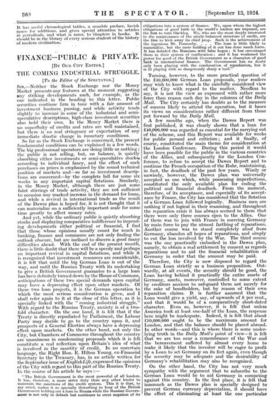FINANCE-PUBLIC & PRIVATE.
[By OUR CITY EDITOR.]
THE COMING INDUSTRIAL STRUGGLE.
[To the Editor of the SPECTATOR.] SM,—Neither the Stock Exchange nor the Money Market presents any features at the moment suggesting any striking developments such, for example, as the one indicated in the heading to this letter. Public securities continue firm in tone with a fair amount of investment business passing, and while activity tends slightly to increase in some of the industrial and semi- speculative descriptions, -high-class investment securities also hold their own. In the Money Market there is no superfluity of credits and rates are well maintained, but there is no real stringency or expectation of any immediate drastic change in monetary conditions. So far as the Stock Exchange is concerned, the present fundamental conditions can be explained in a few words. The big professional operators are doing little or nothing ; the public is not selling, but, on balance, is quietly absorbing either investments or semi-speculative stocks? according to individual fancy, and the effect of such purchases on prices is emphasized by the sound technical position of markets and—so far as investment descrip- tions are concerned—by the complete lull for some six weeks in any important capital flotations. Similarly, in the Money Market, although there are just some faint stirrings of trade activity, they are not sufficient to occasion any marked increase in the demand for loans, and while a revival in international trade as the result of the Dawes plan is hoped for, it is not thought that it can materialize on a sufficiently important scale for some time greatly to affect money rates. And yet, while the ordinary public is quietly absorbing stocks and displaying comparative indifference to impend- ing developments either political or financial, I find that those whose opinions usually count for much in banking, finance and commerce are not only finding the outlook obscure, but are inclined to discern a good many difficulties ahead. With the end of the present month, there is little doubt that there will be a speedy and perhaps an important revival in capital flotations, and while it is recognized that investment resources are considerable, it is felt that until the big German Loan is out of the way, and until the Russian Treaty with its undertaking to give a British Government guarantee to a large loan has been definitely turned down by the House of Commons, anticipations of these two special demands upon capital may have a depressing effect upon other markets. Of these two loan projects, it is the German operation to which the most serious consideration is given, and I shall refer again to it at the close of this letter, as it is specially linked with the " coming industrial struggle." With regard to the Russian Treaty, anxiety is of a two- fold character. On the one hand, it is felt that if the Treaty is directly repudiated by Parliament, the Labour Party may decide to go to the country upon it, and prospects of a General Election always have a depressing- effect upon markets. On the other hand, not only the City; but Chambers of Commerce throughout the country are unanimous in condemning proposals which it is felt constitute a real reflection upon Britain's idea of what is involved in the sanctity of credit. In no uncertain language, the Right Hon. E. Hilton Young, ex-Financial Secretary to the Treasury, has, in an article written for the September issue of EnglishLife, expressed the opinions of the City with regard to this part of the Russian Treaty. In the course of his article he says :- "- The British Government is the most powerful of all lenders. It has, therefore, a more strict duty than any other lender to maintain the sanctions of the credit system. This it is that, to my mind, makes it so specially disturbing to hear of the British Government holding out a loan to Russis.while the Russian Govern- ment is not only in default but continues to erect negation of its obligations into a system of finance. We, upon whom the highest obligations of good faith to the'-world's lenders me imposed„; are the first to turn blackleg. We, who are the most deeply interested in the maintenance of the nicely-balanced structure of credit, are the ffist to kick away its chief prop. Such is the achievenient of the ingenious Mr. Ponson.by. . . . The loan is little likely to materialize, but the mere holding of it out has done much harm. It has deluded the Russians with false hopes ; it has encouraged them in their system of confiscation ; and it has weakened the power for good of the British Government as a champion of good faith in international finance. The Government has no doubt only been playing with the condonation of repudiation, but it is ill playing with so dangerously sharp a tool."
. Turning, however, to the more practical question of the £40,000,000 German Loan proposals, your readers may wish to know what is the carefully considered view of the City with regard to the matter: Needless to say, it is not the view as expressed with rather more force than reason each day in the columns of the Daily Mail. The City certainly has doubts as to the measure of success likely to attend the operation, but it bases its views on considerations rather different from those put forward by the Daily Mail. A few months ago, when the Dawes Report was first published, it was clearly shown that a loan for £40,000,000 was regarded as essential for the carrying out of the scheme, and this Repo- rt was available for weeks for public perusal and criticism ; and it finally, of course, constituted the main theme for consideration at the London Conference. During this period it would have been possible for the public in the various countries of , the Allies, and subsequently for the London Con- ference, to refuse to accept the Dawes Report and to continue the French occupation of the Ruhr, maintaining, in fact, the deadlock of the past few years. Wisely or unwisely, however, the Dawes plan was universally accepted as one which, while possessing imperfections, constituted the only available plan for ending the political and financial deadlock. From the moment, therefore, of its acceptance, and especially of its accept- ance by France, the City has considered that the.flotation of a. German Loan followed logically. Bus. iness men are nothing if not logical in their reasoning, and throughout the reparation crisis it has always seemed to them that there were only three courses open to the Allies. One of them was to join with France in coercing_ Germany by main force to pay the utmost farthing of reparations. Another, course was to stand completely aloof from Germany, abandon all hopes of reparations, and simply to cut the loss involved by the War. The third course was the one practically embodied in the Dawes plan namely, to obtain a real settlement by consent as regard; reparations and to aid the financial rehabilitation of Germany in order that the amount may be paid.
Therefore, the City is now disposed to regard the German Loan strictly as a business proposition. Out- wardly, at all events, the security shbuld be good, the Loan having behind it practically the entire assets of Germany, assets, moreover, controlled to some extent by creditors anxious to safeguard them not merely for the sake of bondholders, but by reason of their own reparation claims. It is further assumed that the Loan would give a yield, say, of upwards of 8 per Cent., and that it would be of a comparatively short-dated character. Even so, however, it is felt that unless America took at least one-half of the Loan, the response here might be inadequate. Indeed, it is felt that about £10,000,000 ought to be the maximum amount for London, and that the balance should be placed abroad. In other words—and this is where there is some under- lying truth in the Daily Mail's point of view—it is felt that we are too near a remembrance of the War and the bereavement suffered by almost every home to make it likely that the investor will be eager to profit by a Loan to set Germany on its feet again, even though the security may be adequate and the desirability of Germany's rehabilitation may also be recognized.
On the other hand, the City has not very much sympathy with the argument that to subscribe to the German Loan would be to aid Germany in competing against this country. In the first place, it is felt that inasmuch as the Dawes plan is specially designed to prevent German currency depreciation, it should have the effect of eliminating at least the one particular danger of German exports being stimulated by a depre ciated exchange. In the second place, it is felt to be quite time that the workers of this country were brought to a full realization that, German Loan or no German Loan, gold standard or no gold standard, we are likely to be faced with a big industrial struggle in which the inevitable effect of international competition will be to call for that increased and cheapened output which Trade Union restrictions are doing their best to impede. Industrial reports, testify to- the extent to which we are already handicapped in competing with other countries by our high costs of production.—I am, Sir, yours The City, September 10th.



































 Previous page
Previous page